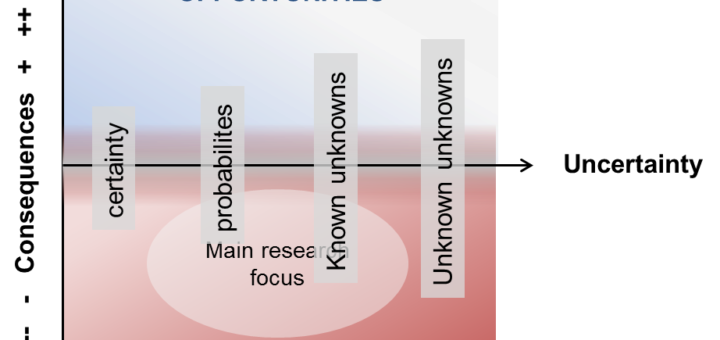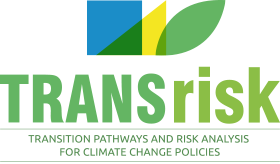Choices regarding mitigating climate change are associated with a range of risks and uncertainties. By investigating these choices, a broad conceptual framework accounting for exogenous risks, as risks to the implementation of a policy choice, and consequential risks, as risks resulting from an implemented policy, in the areas of political, regulatory, social, economic, and environmental risks was developed.
Mitigating climate change requires a wide range of choices to be made by different stakeholders, at different jurisdictional scales and for different time horizons. Globally, such choices are taken with regards to long-term temperature targets. Both internationally and nationally relevant are choices with regards to emission reduction targets. Nationally, choices need to be made on how to set effective incentives. At the firm and household level technology adoption, and other behavioural questions determine the success of meeting targets, which are set at higher levels. Most of these choices are associated with a range of relevant risks and uncertainties, therefore “the selection of climate policies should be an exercise in risk management” (Kunreuther et al., 2013).
The objective of this literature review is to explore comprehensively which risks and uncertainties are associated with different climate policy choices, the qualitative and quantitative approaches used for their analysis, and potential bias in scientific research. To this end we developed a broad conceptual framework accounting for exogenous risks, as risks to the implementation of a policy choice, and consequential risks, as risks resulting from an implemented policy, in the areas of political, regulatory, social, economic and environmental risks. We considered uncertainties resulting from insufficient knowledge (epistemic), from lack of agreement on the framing of a problem (paradigmatic), or from conflicting scientific findings (translational).
We set up a transparent review process, in order to account for the broad and diverse body of literature. We designed a search algorithm including climate policy choices in several sectors, energy production, transport, agriculture and other land uses, buildings and other industry. Risks and uncertainties and their synonyms remained unspecified, thus not biasing the review towards certain risks and uncertainties.
Ultimately, 410 articles matched our strict requirements, and explicitly analyised risks and or uncertainties associated with climate policy choices. At the more general level, the most pronounced gaps emerging from the review are the overwhelming methodological bias towards quantitative and model-based analysis, and the strong focus on the energy production sectors. This in part explains the focus of the existing literature on epistemic risks, and in particular on economic risks, as many social, political and regulatory risks, are more difficult to assess quantitatively. At the same time environmental risks of mitigation policies seem under researched, potentially, because in their function as climate policies they are a-priori considered to be environmentally friendly. Concerning uncertainties, our review indicated an overwhelming focus on epistemic uncertainties, i.e. insufficient knowledge or even ignorance as to the probabilities of certain positive or negative impacts. Uncertainties resulting from disciplinary disagreement, or insufficient communication were hardly considered.
The complete and in depth review is still in progress and is expected by the end of the year or early 2017. The current version of the deliverable primarily serves to document the method.
Lead Authors: Susanne Hanger and Oscar van Vliet (ETHZ)
The full text can be downloaded from the TRANSrisk website.

TRANSrisk
Project details
- Project title: “Transitions Pathways and Risk Analysis for Climate Change Mitigation and Adaption Strategies” (TRANSrisk)
- Funding scheme: European Union Horizon 2020 Programme (EU H2020, grant agreement no. 642260)
- Duration: 3 years (1 September 2015 – 31 August 2018)
- Project coordinator: Science Policy Research Unit, University of Sussex, United Kingdom
- Project website: www.transrisk-project.eu


